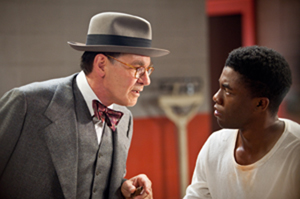“42” a caricatured, yet undeniably entertaining biopic
April 18, 2013
On the first floor of Posvar Hall, you can stand where Jackie Robinson jogged home after belting a home run against the Pirates, helping the Brooklyn Dodgers clinch the pennant in 1947. Most students know that Forbes Field, along with the Cathedral of Learning, used to dominate the Oakland landscape. But the storied ballpark’s legacy of racial discrimination rarely makes it into Pathfinder tours.
Forbes Field was just one of many historic ballparks featured — in impressive CGI — as a hotbed of racial tension and America’s sullied pastime in Brian Helgeland’s “42.” Robinson (Chadwick Boseman) crawling through the trenches of baseball’s traditional segregation and prejudice makes for an inspirational and heartening story, even if the often awkward, unwieldy dialogue slows it down considerably.
Dodgers owner Branch Rickey (Harrison Ford) recruits Robinson, and after a short stint in the minor leagues, the swift-footed, hot-tempered infielder becomes the first African-American in professional baseball. As the only black player in a league of more than 400 athletes, he’s clearly in the minority, and the racial barriers that divide the country play out on the diamond.
Some clever camera work makes for powerful baseball action scenes. Baggy jerseys are caked in mud. Players throw with hunched backs and dropped elbows. The line drives and small-ball-type play that once dominated the game replace the home run-oriented, sluggish hacks of today. Social commentary aside, the movie is nothing if not authentically “baseball.”
For sports fans, “42” hits on many levels, and they will appreciate it for its adherence to history. But Helgeland’s unwillingness to drift from that history, while admirable, can at times be frustrating. Several details — such as the abrupt departure of manager Leo Durocher (Christopher Meloni) before the team enters “the tempest” of a season — feel forced and out of place. Some concessions for the sake of evenness and fluidity wouldn’t have damaged the film as Helgeland feared.
Ford’s caricatured representation of the God-fearing, cigar-smoking Rickey works because only the most eccentric owner would even consider desegregating baseball. And Boseman’s balance of fierce stares and disarming grins — moments of constraint and moments of implosion — do well to reveal just the tip of the complexities and conflicts that make up the iceberg of Robinson’s character.
Not only does he have to play under the thunderous roars of racist crowds at every ballpark — not to mention the filing cabinet full of received death threats — Robinson contends with prejudice in the locker room. It takes an entire season of grit, guts and stolen bases for Robinson to win over some of his teammates and some of the country.
“There was something unfair at the heart of the game I loved,” Rickey says in a rare moment of composure and grace. “You let me love baseball again.”
It’d be doing the legend a dishonor to portray Jackie Robinson as anything but a hero, and Helgeland rises to the task with a passionate and loyal biography. But, although perhaps true to the time, the periphery characters, such as teammates and fans, are decidedly one-dimensional. Without nuance you have no choice but to love anyone who isn’t overtly racist.
Robinson’s at-bats in Philadelphia, under an avalanche of racial slurs from the Phillies’ manager, are painful and actually infuriating to watch: in a word, effective. Helgeland sacrifices any opportunities to subtly hammer in just how hostile white America was to the game’s first black player.
Only when Robinson’s wife, Rachel (Nicole Beharie), wraps her arms around him and puts her chin on his shoulder, does Robinson’s guard seem to drop. You see a man, worn, weathered and in need of his wife, rather than the immortal Jackie Robinson. These moments, peppered diligently throughout “42,” help temper the weighty message and tone that dominate Rickey’s office, the locker room and the batters’ box. Beharie’s elegance in every scene is a nice break from a movie drenched with the ugliness of segregation. You’ll welcome the breathing room.
The movie has the spirit and vitality you’d expect from such a pivotal moment in the Civil Rights Movement. Although it could have benefited from a smoother script, “42” plays with your senses of shame and hope, embarrassment and buoyancy — not to mention frustration and fulfillment — not unlike how Jackie Robinson got in the heads of every pitcher he tormented.







